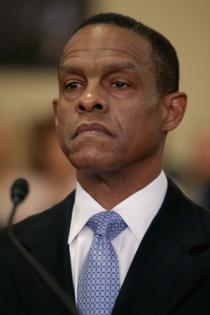How getting 'jacked up' by police helped shape the LAPD's chief watchdog
Published in News & Features
LOS ANGELES — Since taking over as president of the Los Angeles Police Commission in August, Erroll Southers has drawn praise — and some criticism — for his stewardship of the civilian agency charged with oversight of the city's Police Department.
A career law enforcement official and former FBI agent, Southers now teaches about security issues as a professor at USC. He sat down with the Los Angeles Times in his office on the first floor of LAPD headquarters earlier this month to reflect on his first year with the Commission, former Chief Michel Moore's legacy, officer recruitment and the need to explore alternatives to armed police for certain emergencies. The interview has been edited for length and clarity.
LAT: Now that you've kind of dipped your toes into the water and have some experience, what do you see your role as or the Commission's role in general?
Southers: I'm only the second former police officer in the history of the commission, so I come to this with a very different lens. In fact, many of these folks in this building were my graduate students over the last 20 years. So with that, there's a relationship. I've known and been around the LAPD for 44 years. But now I've got people upstairs that have been in my classroom [at USC]. And that's a different relationship.
I think there's a comfort level perhaps with me, more so than others because I, quite frankly, don't need to go on a ride-along. They know that I've been in their shoes, radio calls, challenging times. When I was in the [FBI], SWAT, field training officer, gangs and all those other things, I've worked those details. When I sit in closed sessions on categorical uses of force, I can ask questions from a perspective of experience that perhaps my colleagues can't.
LAT: The commission has long held this policy-making role inside the department and a watchdog oversight sort of role, but has it evolved, and do you think that it needs to evolve?
Southers: I think it needs to evolve and I think we can be part of that evolution. I don't know that we could prompt the evolution that's necessary, with all due respect, without the George Floyd death happening. This, to me, stimulated some reform. The unfortunate thing is … we live in a zero-sum America. It's unfortunate that ... you say "police reform," and they hear "defund the police." You say "DEI" [diversity, equity and inclusion] and someone hears, "white genocide." That's not what this is about, and that needs to change. And that's just not about policing, that's about America.
LAT: What do you see as the biggest issues, problems, concerns facing the department today?
Southers: Number one has to be — I would have to go along with the mayor — recruitment and retention.
We're getting the interest. People still want to be with LAPD. And I'm going to be very candid with you: that room [at recruitment events] has its share of women, that room has its share of African Americans, Hispanics, Asians, young [people]; there are people there in their 50s, I mean, we're having no problem getting people in the room. It's the standard that we're maintaining. And I say this to push back on the folks out there who believe that we've compromised in some way: No, we haven't. That's the reason we only get five to 10 out of 100.
...continued
©2024 Los Angeles Times. Visit at latimes.com. Distributed by Tribune Content Agency, LLC.







Comments